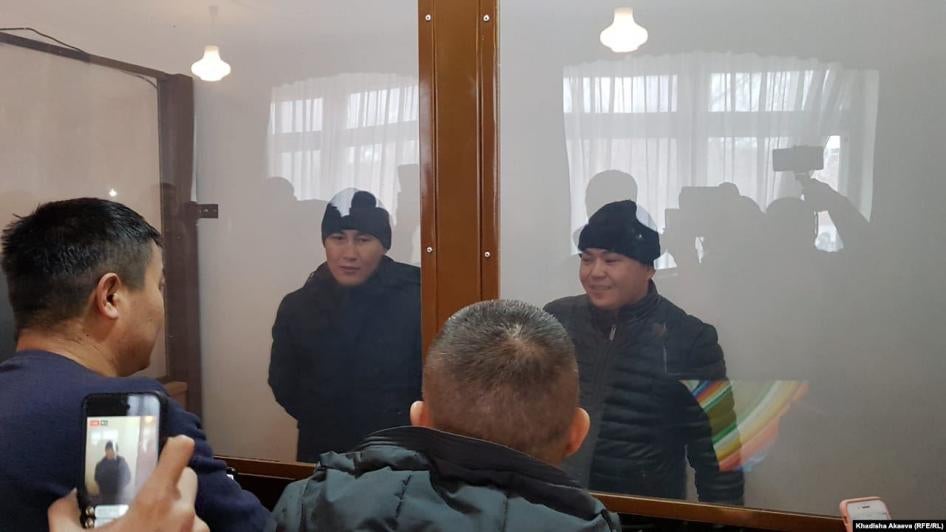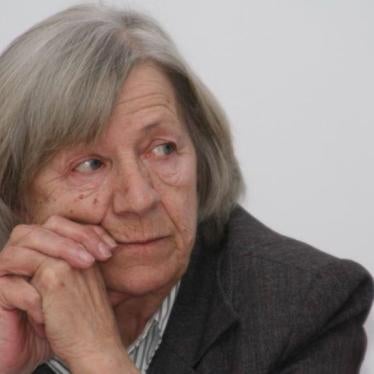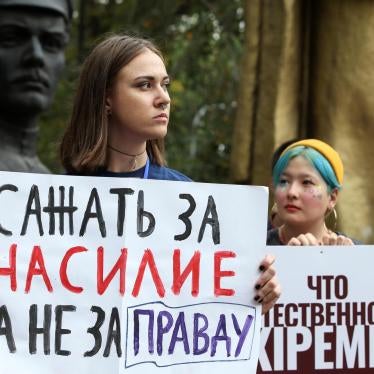Update: On January 21, 2020, Kaster Musakhanuly and Murager Alimuly were sentenced to one year in prison for illegally crossing the border. The court ruled not to deport them to China, but their lawyer said an asylum request in Kazakhstan is still pending. Due to time already served, they will be eligible for release in six months. As a party to the 1951 Refugee Convention it is a violation of Kazakhstan's treaty obligations (see art.31) to impose penalties on refugees for illegal entry.
(Berlin) – Kazakhstan should not forcibly return two Chinese citizens fleeing ill-treatment in Xinjiang or prosecute them for illegal border crossing while their asylum claims are pending, Human Rights Watch said today.
On January 6, 2020, court hearings against the two ethnic Kazakh men, Kaster Musakhanuly and Murager Alimuly, on charges of illegal border crossing began in the remote eastern town of Zaysan. The hearing was adjourned after only two hours, although dozens of witnesses and supporters had traveled there to testify on their behalf, and the case was postponed to January 21. If returned to China, the men would almost certainly face detention and a real risk of torture.
“The government should immediately drop charges of illegal border crossing, halt these proceedings, and guarantee that these men will not be sent back to China as long as their refugee claims are pending,” said Laura Mills, Europe and Central Asia researcher at Human Rights Watch. “Kazakhstan can take this opportunity to demonstrate that, unlike in the past, it is a country that upholds its international legal obligations, respects refugee rights, and won’t return people to risk of torture.”
Musakhanuly, 31, and Alimuly, 25, were detained on October 14 in Almaty, and then held in the far eastern part of the country, near the border with China. The two men said they had faced mistreatment, including torture, and arbitrary detention in Xinjiang, and fled when they learned they would be sent to “political education” camps. The two men say they still have family in Xinjiang, including some who have been sent to the camps.
The lawyer for the two men, Lazzat Akhat, said they had applied for asylum in Kazakhstan but that the request was pending because of the trial. In December 2019, Darkhan Dilmanov, Deputy Chief of Kazakhstan’s National Security Committee, said the two men had “no chances of staying” in the country after the trial, and that “we will transfer them to the People’s Republic of China.”
International law explicitly prohibits refoulement, or the forcible return of a refugee to a place where they would most likely face persecution, or of any person to a country where they would face torture. The United Nations Committee Against Torture has on several previous occasions found Kazakhstan violated its treaty obligations under the Convention Against Torture for sending persons to countries where they were at risk of torture. It has called on Kazakhstan to ensure this does not happen again and that adequate legal provisions and judicial mechanism exist and function effectively to prevent it.
The Chinese authorities have repeatedly denied that “political education” camps exist, but Human Rights Watch investigations found that hundreds of thousands of Uighurs and other Turkic Muslims, including ethnic Kazakhs, have been arbitrarily detained, tortured, and subjected to political indoctrination in facilities in Xinjiang. Human Rights Watch has also documented the forced return and subsequent disappearance of Turkic Muslims to China.
Akhat said that she was not allowed to consult with her clients during or after the January 6 court proceedings. She said that because of this and other behavior during the hearing raising concerns about the judge’s independence, she would request that the judge be removed from the case before the trial continues.
Kazakhstan, which shares a border with China, has made conflicting statements regarding the situation in neighboring Xinjiang, at times publicly acknowledging the repression of Muslim minorities, including ethnic Kazakhs, while signaling support to China at others.
In 2018 Sayragul Sauytbai, an ethnic Kazakh woman with Chinese citizenship who spoke out publicly about her experience as a trainer in the camps, was convicted for illegally crossing the border, but was given a suspended sentence and eventually allowed to resettle in Sweden, where she now lives. Two more prosecutions for illegal border crossing against men fleeing China, Tilek Tabarikuli and Bagashar Malikuli, are pending. These should also be dropped. In addition, Gulzire Awulqanqizi, a Chinese national and ethnic Kazakh who spent more than a year in the camps, learned in December that she was in danger of forced repatriation to China. Such repatriation would almost certainly violate Kazakhstan’s legal obligations under the Convention Against Torture.
Kazakhstan has also prevented local activists from campaigning on behalf of those fleeing repression in China. Serikzhan Bilash, who exposed human rights violations in Xinjiang, was released from prison in August on the condition that he cease all activism.
Kazakhstan acceded to the 1951 Refugee Convention and its 1967 Protocol in 1999. Art. 31 of the Refugee Convention prohibits countries from imposing penalties on refugees for their illegal entry in recognition of the fact that many refugees must cross borders clandestinely to escape persecution and seek international protection. Kazakhstan acceded to the United Nations Convention Against Torture in 1998. Art. 3 of that convention prohibits countries from expelling, returning, or extraditing a person to another country where they would be in danger of torture.
“Kazakhstan should uphold its international legal obligations and protect these men from the persecution they will most likely face if returned to China,” said Mills.









